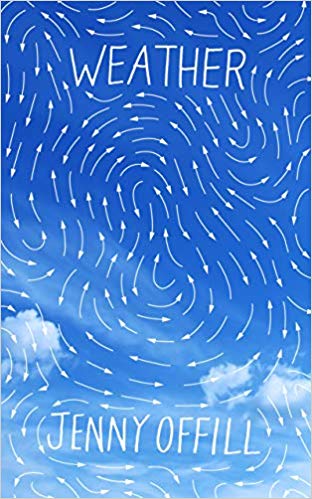We’re living in uncertain times. What with being in the middle of a global pandemic and not being able to buy a single roll of toilet paper or, you know, figure out what on earth is happening, it’s only natural that we might feel anxious. So, considering the current state of the world, the subject matter of Jenny Offill’s latest fictional offering, Weather, couldn’t be more apt.
The story follows Lizzie Benson, a ‘librarian without a degree’ and an ‘unofficial shrink’ as she tries to care for her religious mother, her recovering addict brother Henry, a husband (Ben) and young son, Eli. Lizzie begins working for her old mentor Sylvia Liller, famous for her successful podcast Hell or High Water, and starts answering correspondence from left-wingers frightened about climate change as well as right-wingers concerned about a perceived decline in western civilisation. Soon, Lizzie finds herself having to navigate a world that feels increasingly maddening and unsafe. Weather is about living at the end of the world and trying to understand climate change, motherhood and relationships – all themes that have the power to baffle and scare should we analyse them too closely. So, like I said, it’s pretty apt.
I finished reading Weather a few days before news of the coronavirus had swept the nation and the world was gripped by panic. But I was already alarmed by the various international catastrophes which have occurred in recent months, regularly checking news channels and becoming gripped by updates on social media. Needless to say, this novel has resonated with me.
Offill manages to tap into this feeling of disquiet with great ease and skill. She creates beautiful sentences which describe almost perfectly the feeling of being lost and rudderless, but it’s the gaping silences and what she chooses not to disclose that hold the most weight. Everything we need to know, the real meaning, exists in the blank spaces around Offill’s words. Each paragraph is brief yet perfectly formed. The narrative is engaging but there’s little context and we’re asked to feel our own way through the story (and if that’s not a metaphor for the modern world, I’m not sure what is). The narrative is littered with quotes from Prepper (those who are preparing for the perceived apocalypse) manuals, jokes, lists, and the mail Lizzie answers as part of her job on Hell or High Water. This could be jarring if written by a clunkier hand.
Weather is also preoccupied with the idea of being enlightened, or the struggle to be as enlightened as we can be. While attending a Zen meditation class, Lizzie is urged to let go of everything and everyone she loves. ‘Everything and everyone I love? Isn’t there one for beginners?’ she pleads, desperately searching for compromise.
 Another central theme is the idea of how we live our lives, care for one another, work, love and endure during the destruction of the Anthropocene. As Lizzie spends more time answering questions from Hell or High Water, she becomes obsessed with survival tips and begins collecting and listing them, fantasising about the ways she could protect her family should the time come. Meanwhile, her brother Henry slips back into poor mental health and drug use following the birth of his first child. He becomes fixated on the idea that he’ll harm his child and so Lizzie asks him to write his thoughts down before ripping them up to destroy their power. But this only serves as a reminder for Lizzie about all the ways we’ve already harmed our children and how we are asked to exist in a toxic world but still protect our offspring.
Another central theme is the idea of how we live our lives, care for one another, work, love and endure during the destruction of the Anthropocene. As Lizzie spends more time answering questions from Hell or High Water, she becomes obsessed with survival tips and begins collecting and listing them, fantasising about the ways she could protect her family should the time come. Meanwhile, her brother Henry slips back into poor mental health and drug use following the birth of his first child. He becomes fixated on the idea that he’ll harm his child and so Lizzie asks him to write his thoughts down before ripping them up to destroy their power. But this only serves as a reminder for Lizzie about all the ways we’ve already harmed our children and how we are asked to exist in a toxic world but still protect our offspring.
While this might seem bleak, Weather is not a difficult read. There have been plenty of novels, articles, op-eds and discussions about climate change, but none have made me feel quite the way Offill did after reading Weather. It’s light in places (some of the other characters seem ethereal) and witty, almost comical. Lizzie’s conscience and anxiety do battle with her desire for a meaningful life, especially for her son. ‘I’ve changed my mind. You can have a child. It will be small and cat-eyed. It will never know the taste of meat,’ she says towards the end of the story.
Weather is a remarkable piece of fiction. It comes closer to answering the important question, how do we live in a world that we are actively destroying?, without evangelism from either side of the argument. Is there a more important novel to be reading right now? No. Lizzie proceeds with hope. And that’s something we can all embrace in these strange days.
By Emma Yates-Badley, Literary Editor
Weather is published by Granta and available to buy now











